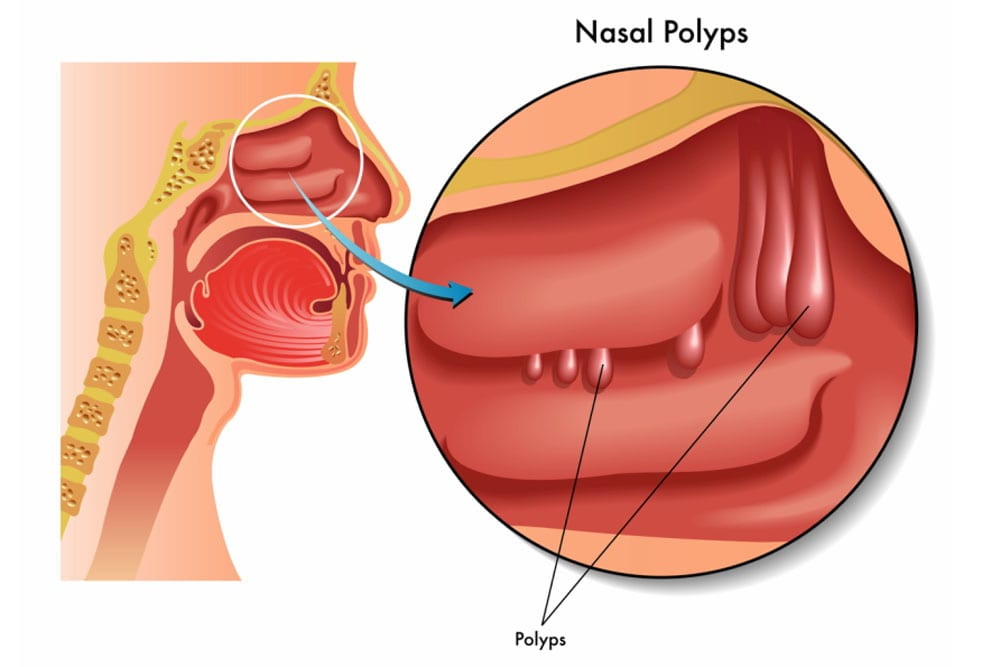Nasal polyps are soft, painless growths that develop inside the nose or sinuses, usually due to allergies or repeated infections. Though they aren’t harmful, they can be bothersome, affecting your ability to breathe and even smell.
Homeopathy offers a gentle, natural way to manage nasal polyps, without the worry of side effects. The goal is twofold: first, to ease symptoms like a stuffy nose or loss of smell, and second, to gradually reduce the size of the polyps by addressing the underlying cause. By strengthening the immune system, homeopathic remedies help reduce the chances of future infections and can even calm an overactive immune response to prevent frequent allergies.
Unlike conventional treatments like nasal sprays or antihistamines, which often provide only temporary relief and can sometimes lead to dependency, homeopathic treatments aim for long-term relief. With consistent use under the guidance of a homeopath, you can gradually reduce the need for treatment as your symptoms improve.
Homeopathy also offers a safe alternative to surgery, which may not provide a permanent solution as polyps can regrow if the root cause isn’t addressed. Homeopathic remedies gently shrink nasal polyps over time, making surgery unnecessary in many cases.
Top 7 Homeopathic Remedies for Nasal Polyps:
- Lemna Minor: This remedy is highly effective for blocked noses and loss of smell due to nasal polyps. It’s especially helpful when the polyps worsen in damp weather, and there’s a thick, yellow-white discharge.
- Teucrium: Ideal for nasal polyps that cause a blocked nose on the side you sleep on. It’s also useful if you experience frequent sneezing, a crawling sensation in the nose, or a loss of smell.
- Sanguinaria Nitricum: This remedy works well for polyps on the right side of the nose, particularly when there’s a watery, burning discharge.
- Calcarea Carb: Best for left-sided nasal polyps, this remedy addresses symptoms like a blocked nose, yellow discharge, and a tendency to catch colds easily.
- Allium Cepa: This remedy is great for nasal polyps that cause constant sneezing and a burning, watery nasal discharge.
- Kali Bichromicum: Effective for thick, lumpy postnasal discharge, this remedy also helps when polyps are linked to chronic sinusitis.
- Phosphorus: Recommended for nasal polyps that bleed easily, especially if accompanied by coryza, sneezing, and a dull headache.
Frequently Asked Questions:
- What increases the risk of nasal polyps? Chronic nasal infections, sinusitis, and allergies are common risk factors, but not everyone with these conditions will develop polyps. Other conditions like asthma or cystic fibrosis may also be linked.
- How can I tell if I have nasal polyps? A stuffy nose, breathing through your mouth, loss of smell, snoring, and postnasal drip are common signs. Small polyps may not cause any symptoms.
- What tests are used to diagnose nasal polyps? Doctors may use nasal endoscopy, CT scans, or MRIs to diagnose nasal polyps. Allergy tests might also be conducted.
- Are there different types of nasal polyps? Yes, there are two main types: antrochoanal polyps, which are usually single and one-sided, and ethmoidal polyps, which are often multiple and found on both sides.
- Can sinusitis cause nasal polyps? Yes, sinusitis is a major risk factor, though not everyone with sinusitis will develop polyps.
- Are nasal polyps the same as turbinate hypertrophy? No, nasal polyps are soft growths, while turbinates are normal structures in the nose that can become enlarged due to infections or allergies.
- Could my snoring be caused by nasal polyps? Snoring can be a symptom of nasal polyps, but other factors like a deviated septum or enlarged adenoids could also be the cause.
- Do nasal polyps bleed? They can, but not always. Bleeding may be more common with certain types of polyps or in more severe cases.

